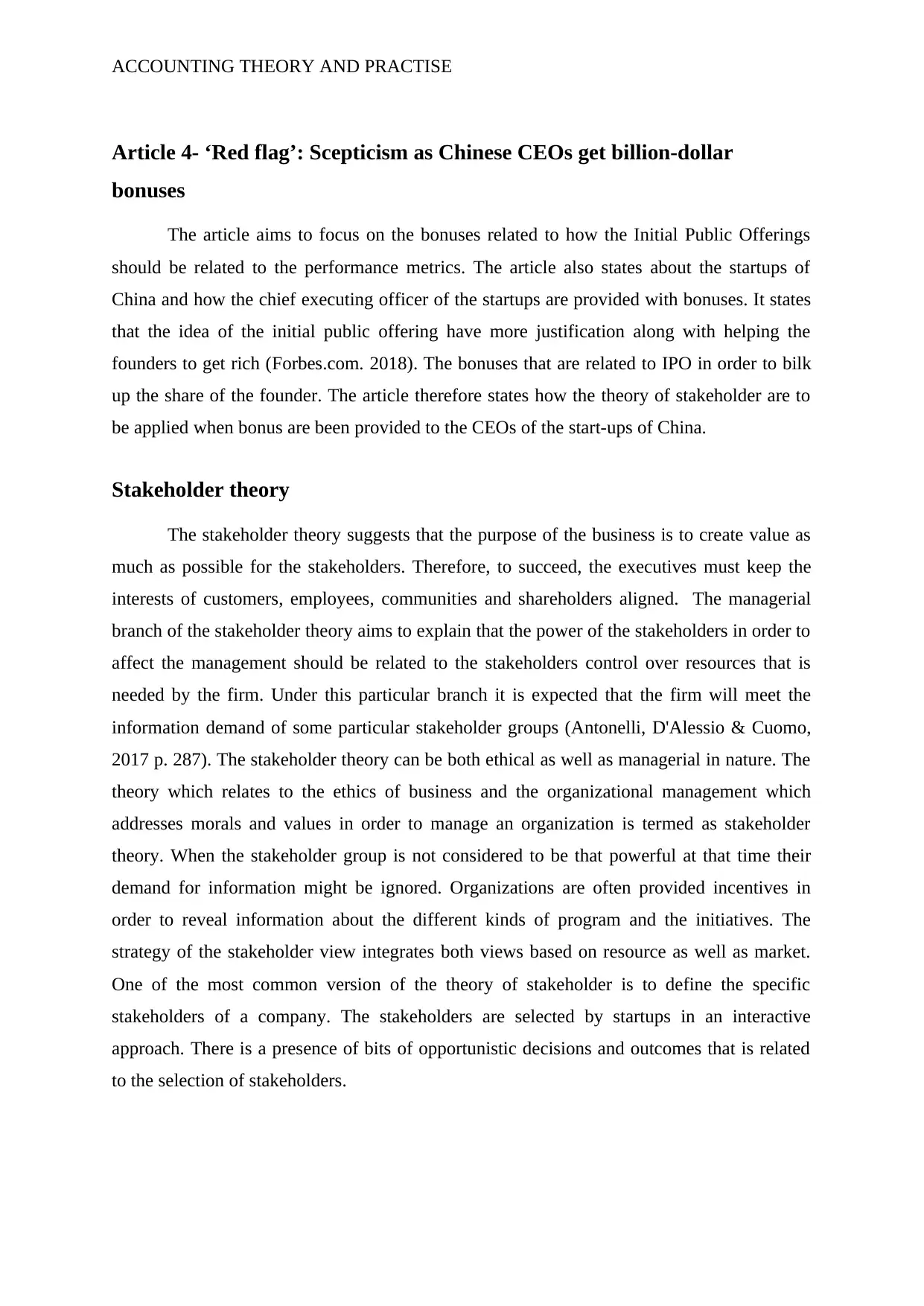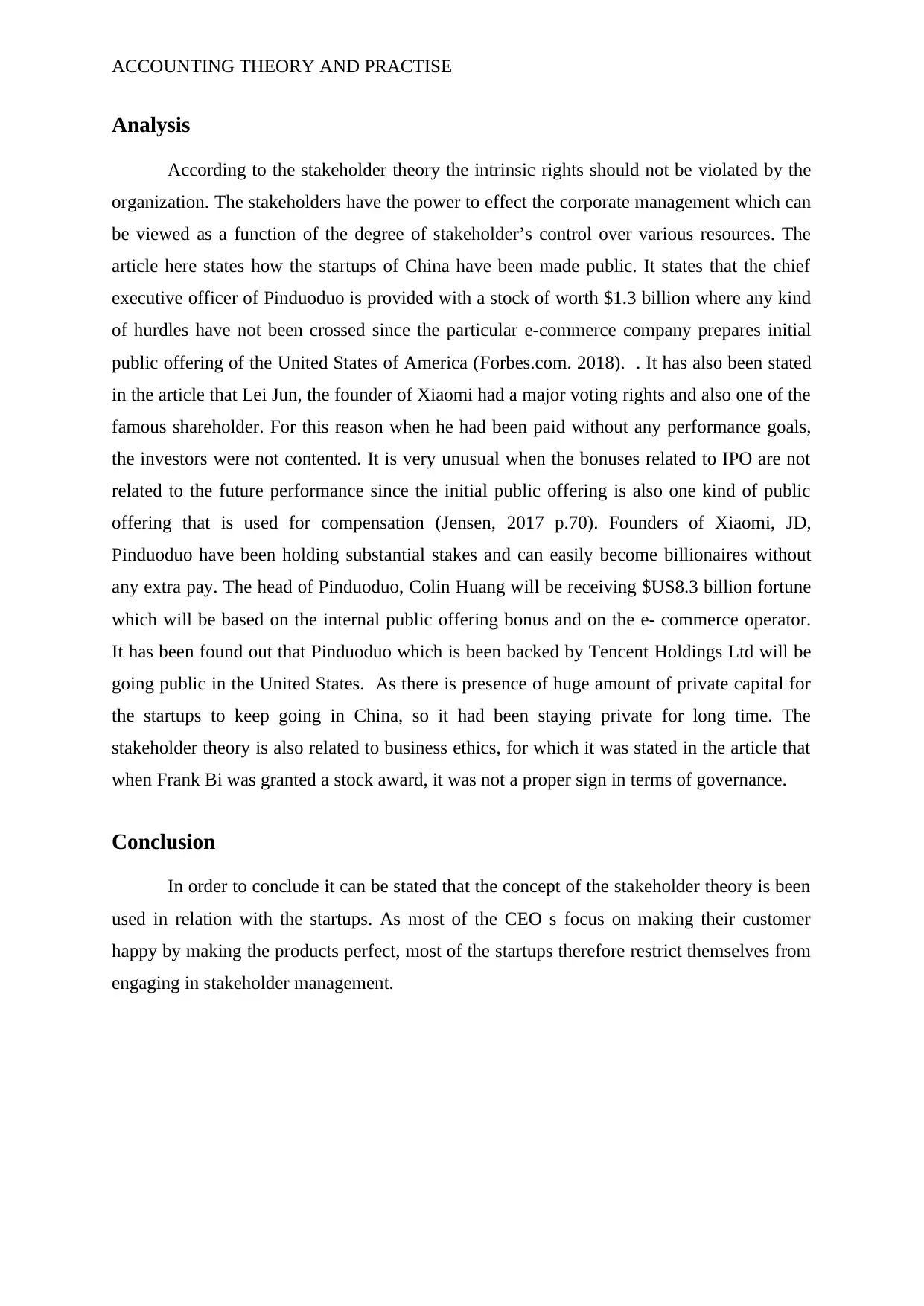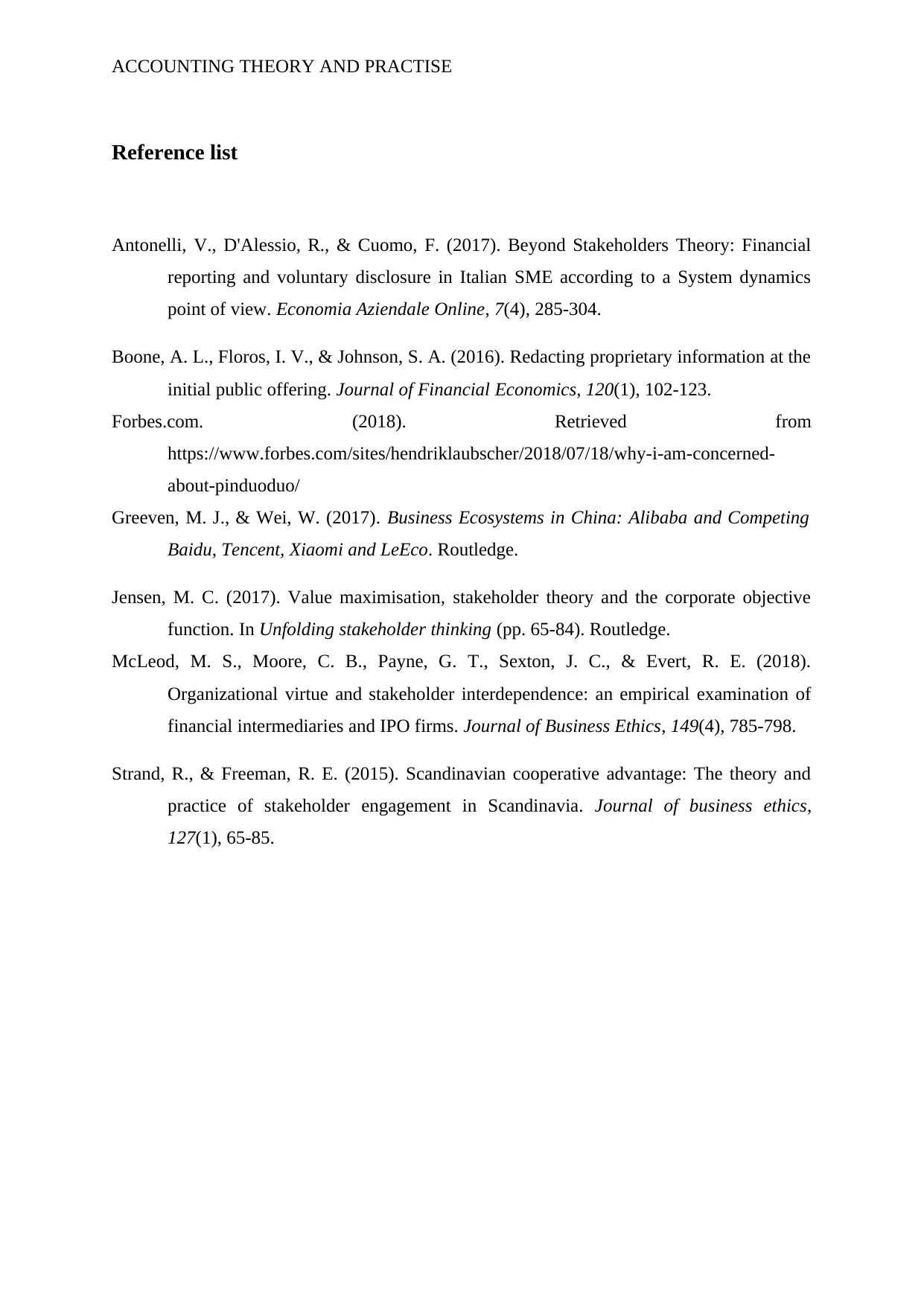Accounting Theory and Practise: Stakeholder Theory in Chinese IPOs
VerifiedAdded on 2023/06/07
|4
|1099
|158
Essay
AI Summary
This essay delves into the application of stakeholder theory in analyzing the substantial bonuses awarded to CEOs of Chinese startups during Initial Public Offerings (IPOs). It critically examines the justification of these bonuses, particularly when they are not directly linked to performance metrics, and explores the potential implications for various stakeholders. The analysis focuses on how companies like Pinduoduo and Xiaomi have structured CEO compensation and voting rights, raising questions about corporate governance and ethical considerations. The essay concludes that while startups often prioritize customer satisfaction, a more comprehensive approach to stakeholder management is essential for long-term sustainability and ethical business practices, aligning with the core principles of stakeholder theory which emphasizes the importance of balancing the interests of all stakeholders, including customers, employees, communities, and shareholders.

Running head: ACCOUNTING THEORY AND PRACTISE
Accounting theory and practise
Name of the student
Name of the University
Author note
Total word count :735
Accounting theory and practise
Name of the student
Name of the University
Author note
Total word count :735
Paraphrase This Document
Need a fresh take? Get an instant paraphrase of this document with our AI Paraphraser

ACCOUNTING THEORY AND PRACTISE
Article 4- ‘Red flag’: Scepticism as Chinese CEOs get billion-dollar
bonuses
The article aims to focus on the bonuses related to how the Initial Public Offerings
should be related to the performance metrics. The article also states about the startups of
China and how the chief executing officer of the startups are provided with bonuses. It states
that the idea of the initial public offering have more justification along with helping the
founders to get rich (Forbes.com. 2018). The bonuses that are related to IPO in order to bilk
up the share of the founder. The article therefore states how the theory of stakeholder are to
be applied when bonus are been provided to the CEOs of the start-ups of China.
Stakeholder theory
The stakeholder theory suggests that the purpose of the business is to create value as
much as possible for the stakeholders. Therefore, to succeed, the executives must keep the
interests of customers, employees, communities and shareholders aligned. The managerial
branch of the stakeholder theory aims to explain that the power of the stakeholders in order to
affect the management should be related to the stakeholders control over resources that is
needed by the firm. Under this particular branch it is expected that the firm will meet the
information demand of some particular stakeholder groups (Antonelli, D'Alessio & Cuomo,
2017 p. 287). The stakeholder theory can be both ethical as well as managerial in nature. The
theory which relates to the ethics of business and the organizational management which
addresses morals and values in order to manage an organization is termed as stakeholder
theory. When the stakeholder group is not considered to be that powerful at that time their
demand for information might be ignored. Organizations are often provided incentives in
order to reveal information about the different kinds of program and the initiatives. The
strategy of the stakeholder view integrates both views based on resource as well as market.
One of the most common version of the theory of stakeholder is to define the specific
stakeholders of a company. The stakeholders are selected by startups in an interactive
approach. There is a presence of bits of opportunistic decisions and outcomes that is related
to the selection of stakeholders.
Article 4- ‘Red flag’: Scepticism as Chinese CEOs get billion-dollar
bonuses
The article aims to focus on the bonuses related to how the Initial Public Offerings
should be related to the performance metrics. The article also states about the startups of
China and how the chief executing officer of the startups are provided with bonuses. It states
that the idea of the initial public offering have more justification along with helping the
founders to get rich (Forbes.com. 2018). The bonuses that are related to IPO in order to bilk
up the share of the founder. The article therefore states how the theory of stakeholder are to
be applied when bonus are been provided to the CEOs of the start-ups of China.
Stakeholder theory
The stakeholder theory suggests that the purpose of the business is to create value as
much as possible for the stakeholders. Therefore, to succeed, the executives must keep the
interests of customers, employees, communities and shareholders aligned. The managerial
branch of the stakeholder theory aims to explain that the power of the stakeholders in order to
affect the management should be related to the stakeholders control over resources that is
needed by the firm. Under this particular branch it is expected that the firm will meet the
information demand of some particular stakeholder groups (Antonelli, D'Alessio & Cuomo,
2017 p. 287). The stakeholder theory can be both ethical as well as managerial in nature. The
theory which relates to the ethics of business and the organizational management which
addresses morals and values in order to manage an organization is termed as stakeholder
theory. When the stakeholder group is not considered to be that powerful at that time their
demand for information might be ignored. Organizations are often provided incentives in
order to reveal information about the different kinds of program and the initiatives. The
strategy of the stakeholder view integrates both views based on resource as well as market.
One of the most common version of the theory of stakeholder is to define the specific
stakeholders of a company. The stakeholders are selected by startups in an interactive
approach. There is a presence of bits of opportunistic decisions and outcomes that is related
to the selection of stakeholders.

ACCOUNTING THEORY AND PRACTISE
Analysis
According to the stakeholder theory the intrinsic rights should not be violated by the
organization. The stakeholders have the power to effect the corporate management which can
be viewed as a function of the degree of stakeholder’s control over various resources. The
article here states how the startups of China have been made public. It states that the chief
executive officer of Pinduoduo is provided with a stock of worth $1.3 billion where any kind
of hurdles have not been crossed since the particular e-commerce company prepares initial
public offering of the United States of America (Forbes.com. 2018). . It has also been stated
in the article that Lei Jun, the founder of Xiaomi had a major voting rights and also one of the
famous shareholder. For this reason when he had been paid without any performance goals,
the investors were not contented. It is very unusual when the bonuses related to IPO are not
related to the future performance since the initial public offering is also one kind of public
offering that is used for compensation (Jensen, 2017 p.70). Founders of Xiaomi, JD,
Pinduoduo have been holding substantial stakes and can easily become billionaires without
any extra pay. The head of Pinduoduo, Colin Huang will be receiving $US8.3 billion fortune
which will be based on the internal public offering bonus and on the e- commerce operator.
It has been found out that Pinduoduo which is been backed by Tencent Holdings Ltd will be
going public in the United States. As there is presence of huge amount of private capital for
the startups to keep going in China, so it had been staying private for long time. The
stakeholder theory is also related to business ethics, for which it was stated in the article that
when Frank Bi was granted a stock award, it was not a proper sign in terms of governance.
Conclusion
In order to conclude it can be stated that the concept of the stakeholder theory is been
used in relation with the startups. As most of the CEO s focus on making their customer
happy by making the products perfect, most of the startups therefore restrict themselves from
engaging in stakeholder management.
Analysis
According to the stakeholder theory the intrinsic rights should not be violated by the
organization. The stakeholders have the power to effect the corporate management which can
be viewed as a function of the degree of stakeholder’s control over various resources. The
article here states how the startups of China have been made public. It states that the chief
executive officer of Pinduoduo is provided with a stock of worth $1.3 billion where any kind
of hurdles have not been crossed since the particular e-commerce company prepares initial
public offering of the United States of America (Forbes.com. 2018). . It has also been stated
in the article that Lei Jun, the founder of Xiaomi had a major voting rights and also one of the
famous shareholder. For this reason when he had been paid without any performance goals,
the investors were not contented. It is very unusual when the bonuses related to IPO are not
related to the future performance since the initial public offering is also one kind of public
offering that is used for compensation (Jensen, 2017 p.70). Founders of Xiaomi, JD,
Pinduoduo have been holding substantial stakes and can easily become billionaires without
any extra pay. The head of Pinduoduo, Colin Huang will be receiving $US8.3 billion fortune
which will be based on the internal public offering bonus and on the e- commerce operator.
It has been found out that Pinduoduo which is been backed by Tencent Holdings Ltd will be
going public in the United States. As there is presence of huge amount of private capital for
the startups to keep going in China, so it had been staying private for long time. The
stakeholder theory is also related to business ethics, for which it was stated in the article that
when Frank Bi was granted a stock award, it was not a proper sign in terms of governance.
Conclusion
In order to conclude it can be stated that the concept of the stakeholder theory is been
used in relation with the startups. As most of the CEO s focus on making their customer
happy by making the products perfect, most of the startups therefore restrict themselves from
engaging in stakeholder management.
⊘ This is a preview!⊘
Do you want full access?
Subscribe today to unlock all pages.

Trusted by 1+ million students worldwide

ACCOUNTING THEORY AND PRACTISE
Reference list
Antonelli, V., D'Alessio, R., & Cuomo, F. (2017). Beyond Stakeholders Theory: Financial
reporting and voluntary disclosure in Italian SME according to a System dynamics
point of view. Economia Aziendale Online, 7(4), 285-304.
Boone, A. L., Floros, I. V., & Johnson, S. A. (2016). Redacting proprietary information at the
initial public offering. Journal of Financial Economics, 120(1), 102-123.
Forbes.com. (2018). Retrieved from
https://www.forbes.com/sites/hendriklaubscher/2018/07/18/why-i-am-concerned-
about-pinduoduo/
Greeven, M. J., & Wei, W. (2017). Business Ecosystems in China: Alibaba and Competing
Baidu, Tencent, Xiaomi and LeEco. Routledge.
Jensen, M. C. (2017). Value maximisation, stakeholder theory and the corporate objective
function. In Unfolding stakeholder thinking (pp. 65-84). Routledge.
McLeod, M. S., Moore, C. B., Payne, G. T., Sexton, J. C., & Evert, R. E. (2018).
Organizational virtue and stakeholder interdependence: an empirical examination of
financial intermediaries and IPO firms. Journal of Business Ethics, 149(4), 785-798.
Strand, R., & Freeman, R. E. (2015). Scandinavian cooperative advantage: The theory and
practice of stakeholder engagement in Scandinavia. Journal of business ethics,
127(1), 65-85.
Reference list
Antonelli, V., D'Alessio, R., & Cuomo, F. (2017). Beyond Stakeholders Theory: Financial
reporting and voluntary disclosure in Italian SME according to a System dynamics
point of view. Economia Aziendale Online, 7(4), 285-304.
Boone, A. L., Floros, I. V., & Johnson, S. A. (2016). Redacting proprietary information at the
initial public offering. Journal of Financial Economics, 120(1), 102-123.
Forbes.com. (2018). Retrieved from
https://www.forbes.com/sites/hendriklaubscher/2018/07/18/why-i-am-concerned-
about-pinduoduo/
Greeven, M. J., & Wei, W. (2017). Business Ecosystems in China: Alibaba and Competing
Baidu, Tencent, Xiaomi and LeEco. Routledge.
Jensen, M. C. (2017). Value maximisation, stakeholder theory and the corporate objective
function. In Unfolding stakeholder thinking (pp. 65-84). Routledge.
McLeod, M. S., Moore, C. B., Payne, G. T., Sexton, J. C., & Evert, R. E. (2018).
Organizational virtue and stakeholder interdependence: an empirical examination of
financial intermediaries and IPO firms. Journal of Business Ethics, 149(4), 785-798.
Strand, R., & Freeman, R. E. (2015). Scandinavian cooperative advantage: The theory and
practice of stakeholder engagement in Scandinavia. Journal of business ethics,
127(1), 65-85.
1 out of 4
Your All-in-One AI-Powered Toolkit for Academic Success.
+13062052269
info@desklib.com
Available 24*7 on WhatsApp / Email
![[object Object]](/_next/static/media/star-bottom.7253800d.svg)
Unlock your academic potential
Copyright © 2020–2026 A2Z Services. All Rights Reserved. Developed and managed by ZUCOL.


